| Год
|
Изображение
|
Имя
|
Номинация
|
Комментарии
|
| 1986
|

|
Чарльз Тейлор[англ.]
|
«for his outstanding presentations of physics and applications of physics, aimed at audiences from six-year-old primary school children to adults»
|
[2]
|
| 1987
|

|
 Питер Медавар Питер Медавар
|
«for the contribution his books had made in presenting to the public, and to scientists themselves, the intellectual nature and the essential humanity of pursuing science at the highest level and the part it played in our modern culture»
|
[3]
|
| 1988
|

|
Эрик Кристофер Зиман
|
«for the contributions he has made to the popularization of mathematics»
|
[4]
|
| 1989
|
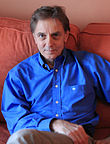
|
Колин Блэйкмор
|
«for his written, broadcast and public presentations on the science of the brain, which are superbly crafted for lay and expert audiences alike»
|
[5]
|
| 1990
|

|
Ричард Докинз
|
«for his written, broadcast and public presentations which are accessible, imaginative and enjoyed by large audiences»
|
[6]
|
| 1991
|
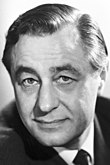
|
 Портер, Джордж Портер, Джордж
|
«in recognition of his outstanding contribution to improving the public understanding of science through his many public lectures and broadcasts, his directorship of the Royal Institution and presidencies of the Royal Society and British Association and his seminal role in the establishment and leadership of COPUS»
|
[7]
|
| 1992
|

|
Грегори, Ричард[англ.]
|
«for his many popular books and papers, his countless public lectures and television and radio appearances, and his creation of the Exploratory Hands-on Science Centre in Bristol»
|
[8]
|
| 1993
|

|
Феллс, Иан[англ.]
|
«for his many written articles for the national press and popular science journals, his public lectures on many platforms often tailored for school children, and his major contribution in broadcasting where he has had an input to over 350 radio and television programmes»
|
[9]
|
| 1994
|

|
Уолтер Бодмер
|
«for his outstanding achievement in raising the public understanding of science and technology as an issue of the highest importance to individual scientists and engineers and to many bodies that represent them»
|
[10]
|
| 1995
|
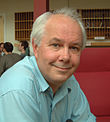
|
Иэн Стюарт
|
«for his work in communicating mathematical ideas to the widest possible range of audiences through his many thought-provoking books and magazine articles, his radio and television presentations, and his energetic public lectures in schools and industry on a variety of mathematical and quasi-mathematical topics»
|
[11]
|
| 1996
|

|
Стив Джонс[англ.]
|
«for his numerous, wide ranging contributions to the public understanding of science in areas such as human evolution and variation, race, sex, inherited disease and genetic manipulation through his many broadcasts on radio and television, his lectures, popular science books, and his regular science column in The Daily Telegraph and contributions to other newspaper media»
|
[12][13]
|
| 1997
|

|
Филлипс, Дэвид
|
«for his outstanding talents in the communication of scientific principles, methods and applications to young audiences through his many demonstration lectures with wit, clarity and enthusiasm on a wide variety of topics from basic science to modern laser research and for his major role in various collaborative ventures for young people with the Royal Institution, the British Association and CREST, and for his popular science articles and contributions to a variety of radio and television broadcasts, combined with his full professional workload as Head of Chemistry at Imperial College and overseeing a research group»
|
—
|
| 1998
|

|
Гринфилд, Сьюзен
|
«for her outstanding talents in communicating to the public how the brain works, popularising brain studies via The Royal Institution Christmas Lectures, lecturing both in Britain and overseas to a wide variety of audiences, including young people, both in schools and outside the classroom, and through her activities as an author of popular books, newspaper articles and columns and her many television appearances»
|
[14][15]
|
| 1999
|

|
Уинстон, Роберт[англ.]
|
«for his outstanding contribution to the public understanding of human infertility and in vitro fertilisation. He has published five books as well as contributing to many newspaper articles. He is renowned as a gifted communicator especially to non-scientists, describing complex issues relating to human infertility clearly and without over-simplification. His major contribution has been in the field of television and radio both hosting and contributing to programmes»
|
[16]
|
| 2000
|

|
Льюис Вулперт
|
«for his enormous contribution to the public understanding of science most notably through his Chairmanship of COPUS and his varied and wide-ranging television and radio programmes as well as his regular contributions to the national broadsheet newspapers. For over two decades, Lewis Wolpert has brought public attention to many subjects including depression which still carries considerable social stigma through books, lectures, newspaper articles using his own brand of enthusiasm and charisma»
|
[17]
|
| 2001
|

|
 Крото, Харольд Крото, Харольд
|
«for his dedication to the notion of working scientists being communicators of their work and in particular for his establishment of the Vega Science Trust whose films and related activities reflect the excitement of scientific discovery to the public»
|
[18]
|
| 2002
|
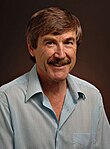
|
Пол Дейвис
|
on The origin of life.
|
[19][20]
|
| 2003
|
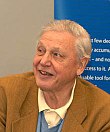
|
Дэвид Аттенборо
|
on Perception, deception and reality
|
[21]
|
| 2004
|

|
Мартин Рис
|
on Einstein’s legacy as scientist and icon
|
[22]
|
| 2005
|

|
Белквиль, Фран[англ.]
|
on A silent killer
|
[23]
|
| 2006
|

|
Фортей, Ричард[англ.]
|
on A natural history of scientists
|
[24]
|
| 2007
|

|
Аль-Халили, Джим
|
on The House of Wisdom and the legacy of Arabic science
|
[25]
|
| 2008
|

|
Джон Барроу
|
on Every picture tells a story
|
[26]
|
| 2009
|
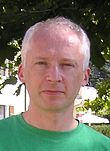
|
Маркус дю Сотой
|
on The secret mathematicians
|
[26]
|
| 2010
|
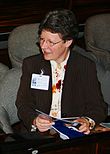
|
Бернелл, Джоселин Белл
|
on The end of the world in 2012? Science communication and science scares
|
[26]
|
| 2011
|

|
Колин Пиллинджер
|
on Stones From the Sky: A Heaven-sent Opportunity to Talk About Science
|
[26]
|
| 2012
|
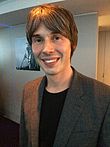
|
Брайан Кокс
|
«for his excellent work in science communication»
|
[26]
|
| 2013
|

|
Клоуз, Франк[англ.]
|
«for his excellent work in science communication»
|
[26]
|
| 2014
|

|
Села, Андреа[англ.]
|
«for his excellent work in science communication»
|
[26]
|
| 2015
|

|
Уиллис, Кэтрин[англ.]
|
«for her excellent work in science communication»
|
[26]
|
| 2016
|

|
Ник Лейн
|
«for his excellent work in science communication»
|
[26]
|
| 2017
|
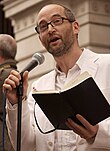
|
Мидовник, Марк[англ.]
|
«for his excellent work in science communication»
|
[26]
|
| 2018
|

|
Джордж, Даниэлла
|
«for her excellent work in science communication»
|
[26]
|
| 2019
|

|
Мартин Полякофф
|
«for his exemplary work to promote chemistry to an international audience via YouTube in a way that is understandable to viewers of all ages.»
|
[26]
|
| 2020
|
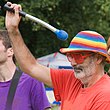
|
David Spiegelhalter[англ.]
|
«for bringing key insights from the disciplines of statistics and probability vividly home to the public at large, and to key decision-makers, in entertaining and accessible ways, most recently through the COVID-19 pandemic.»
|
[26]
|
| 2021
|

|
Sophie Scott[англ.]
|
«for her work in engaging the public with neuroscience through events, talks, TV and radio, and exemplifying how science communication can enhance scientific excellence.»
|
[26]
|
| 2022
|

|
Monica Grady[англ.]
|
«for her significant contributions to the field of planetary science, and her dedication and enthusiasm for public engagement, particularly in raising the profile of STEM subjects for young women.»
|
[26]
|
| 2023
|

|
Анил Сет
|
«for his ability to inspire and communicate concepts and advances in cognitive neuroscience and consciousness, and therefore what it means to be human, to the public.»
|
[26]
|
| 2024
|

|
Salim Abdool Karim[англ.]
|
«for his scientific leadership, policy advice, epidemiological analyses, and articulate public education, while actively countering disinformation in Africa, particularly South Africa, during the Covid-19 pandemic.»
|
[26]
|



































